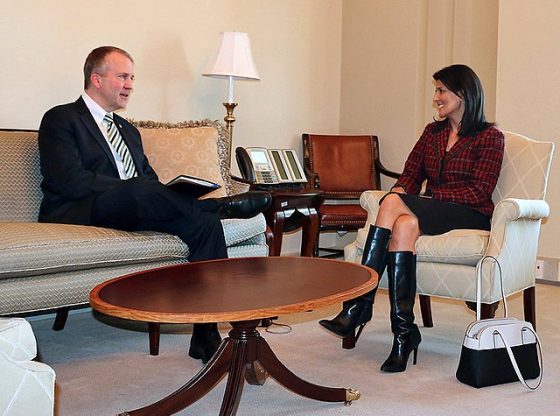Political observers are wondering where former U.N. Ambassador Nikki Haley’s chunk of Republican primary voters will end up in a November rematch between former President Donald Trump and President Joe Biden.
Haley dropped out of the race on Wednesday after only winning one Super Tuesday state against Trump, but declined to endorse her former boss as the presumptive nominee. Trump shouldn’t be concerned over losing Haley’s base to Biden, as many were likely to vote against him anyways and the smaller Republican subset could return to the former president by November, political strategists largely told the Daily Caller News Foundation.
“I think people are misunderstanding tremendously who voted for Haley,” Scott Jennings, a GOP strategist and veteran of numerous campaigns, told the DCNF. “A great many of these people are not available Republican votes. They are Democrats. They are independents who behave as Democrats, or they are ‘never-Trump Republicans’ who didn’t vote for him in ‘16 or ‘20.”
“The idea that he is going to need to go on some reconciliation tour to convince the ‘never-Trump’ voters that were for Haley to come to his side when they’ve never been with him, or at least haven’t been with them since ‘20, is crazy! That’s not going to happen,” Jennings added.
CNN’s exit polling from several Republican primaries largely found Haley received most of her support from “moderate/liberal” voters, Democrats and independents. The surveys also indicated that many Haley supporters were first time Republican primary voters.
Overwhelming majorities of Haley voters said they approve of Biden in Virginia and North Carolina, and few said they’d “vote Republican in [November] regardless of nominee.
Many of the states that have held Republican nominating contests so far have open or semi-open primary systems, allowing Democrats and unaffiliated voters to participate.
“Open primaries are an open invitation for partisan mischief,” Mark Weaver, a veteran Republican strategist, told the DCNF. “Democrats can tiptoe over into the Republican primary and wreak havoc with the candidate they hate the most. That’s who many of these Nikki Haley voters were. They were Democrats or left-leaning independents who don’t like Nikki Haley, they just want to tweak Donald Trump, and open primaries permit that.”
A New York Times/Siena College survey released Sunday found that only 9% of Haley’s registered GOP primary voters said they backed Trump last cycle, as well as 89% who vowed to support Biden in 2024. Only 16% of Republicans went for Haley over Trump.
The same poll indicated 97% of Trump’s 2020 voters will support him in November, compared to 83% of Biden’s previous supporters who said the same of him. Additionally, 10% of Biden’s former voters said they’ll back Trump in 2024.
Haley only won the Vermont and Washington, D.C., primaries, and received her next-largest share of votes in New Hampshire at 43.2%. The former ambassador encouraged Trump to “earn” the support from her voters during her campaign suspension speech.
The former president previously said that Haley’s supporters were “permanently barred” from his camp. Trump changed his tune when she dropped out, and said he’d “like to invite all of the Haley supporters to join the greatest movement in the history of our Nation.”
Biden also made a play for Haley’s voters following her speech.
“Donald Trump made it clear he doesn’t want Nikki Haley’s supporters. I want to be clear: There is a place for them in my campaign,” Biden said in a statement. “I know there is a lot we don’t agree on. But on the fundamental issues of preserving American democracy, on standing up for the rule of law, on treating each other with decency and dignity and respect, on preserving NATO and standing up to America’s adversaries, I hope and believe we can find common ground.”
Still, Republican operatives largely argued that Trump shouldn’t be concerned about winning over the disaffected GOP voters who supported Haley when presented with a choice between him or Biden.
“It’s undeniable that some small subset of these Nikki Haley voters are disillusioned Republicans, and they have a choice to make in the fall — the Biden economy or the Trump economy,” said Weaver. “Many of them will realize that Trump policies help them and their families more than Biden policies do. And they will hold their nose, they will squeeze their eyes shut, and they will push the button for Donald Trump even though they dislike him, but they dislike the Biden policies more.”
Polling largely indicates voters felt better off under the Trump administration than they do Biden’s. Only 18% of registered voters say Biden’s policies have “helped [them] personally, compared to 40% who said the same of Trump’s, according to the NYT/Siena College poll.
Jon McHenry, GOP polling analyst and vice president at North Star Opinion Research, underscored the polling trend, and told the DCNF that Haley’s supporters could come around in the general election.
“At this point in the race, the biggest question for November is, ‘Which candidate can hold on to more of his base?’” McHenry told the DCNF. “It’s a very different thing to say ‘I won’t vote for Donald Trump’ right after you’ve supported Nikki Haley in a primary than actually making a choice between Joe Biden and Donald Trump in November, especially when so many voters right now are saying they were better off during the Trump term than they are now.”
Jim Hobart, Republican pollster at Public Opinion Strategies, echoed McHenry’s sentiment.
“In both 2016 and 2020, Republicans who expressed hesitance to support Trump either during the Republican primary or during the course of the general election campaign almost universally ‘came home’ to Trump by Election Day,” Hobart told the DCNF. “My expectation is that will again be the case in 2024, especially given how deeply unpopular President Biden is with all Republicans.”
Conversely, Dr. Charles Bullock, elections expert and political science professor at the University of Georgia, warned of Trump not being able to win over the Republican subset of Haley’s base.
“I think he clearly should be concerned. Every vote counts, especially in a state like Georgia, Nevada, Arizona, where really, a few votes can determine the outcome,” Bullock told the DCNF.
Haley’s voters could also support one of the various third-party candidates likely to be on the ballot in November, including Robert F. Kennedy Jr., “Justice for All Party” candidate Cornel West, Green Party candidate Jill Stein and No Labels‘ “Unity Ticket.”
Bullock said he’ll be watching to see how many “true Republican voters” will continue to cast ballots for Haley in the remaining contests to gauge how many might defect in November.
Georgia, Hawaii, Mississippi and Washington will hold their respective GOP primaries on March 12, with several more taking place on March 19.
The campaigns for Haley, Trump and Biden did not respond to the DCNF’s requests for comment.
Mary Lou Masters on March 9, 2024












